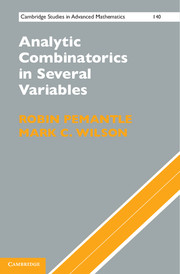Preface
Published online by Cambridge University Press: 05 July 2013
Summary
The term “analytic combinatorics” refers to the use of complex analytic methods to solve problems in combinatorial enumeration. Its chief objects of study are generating functions (Flajolet and Sedgewick, 2009, page vii). Generating functions have been used for enumeration for more than a hundred years, going back to Hardy and, arguably, to Euler. Their systematic study began in the 1950s (Hayman, 1956). Much of the impetus for analytic combinatorics comes from the theory of algorithms, arising, for example, in the work of Knuth (2006). The recent, seminal work by Flajolet and Sedgewick (2009) describes the rich univariate theory with literally hundreds of applications.
The multivariate theory, as recently as the mid-1990s, was still in its infancy. Techniques for deriving multivariate generating functions have been well understood, sometimes paralleling the univariate theory and sometimes achieving surprising depth (Fayolle, Iasnogorodski, and Malyshev, 1999). Analytic methods for recovering coefficients of generating functions once the functions have been derived have, however, been sorely lacking. A small body of analytic work goes back to the early 1980s (Bender and Richmond, 1983); however, even by 1995, of 100+ pages in the Handbook of Combinatorics devoted to asymptotic enumeration (Odlyzko, 1995), multivariate asymptotics received fewer than six.
This book is the result of work spanning nearly fifteen years. Our aim has been to develop analytic machinery to recover, as effectively as possible, asymptotics of the coefficients of a multivariate generating function. Both authors feel drawn to this area of study because it combines so many areas of modern mathematics.
Information
- Type
- Chapter
- Information
- Analytic Combinatorics in Several Variables , pp. xi - xivPublisher: Cambridge University PressPrint publication year: 2013
